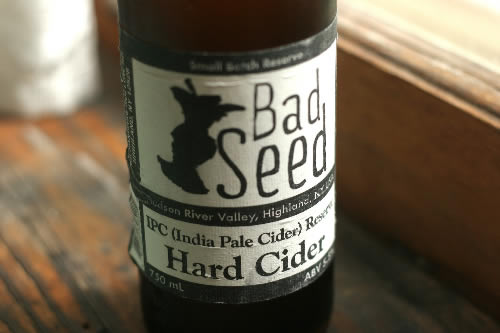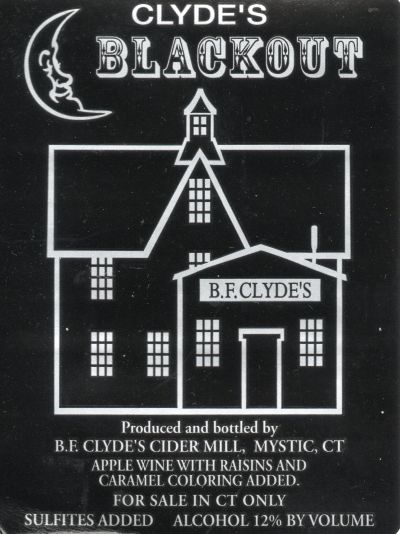Andrew Tobin samples summer ciders
Something about summer entices the Editor to reach for cider. It seems lighter and more refreshing, at least at times, than beer but beware; cider can pack some punch.
Like craft beer, cider has enjoyed a significant return to the American consciousness, and the market has responded with a larger selection of both domestic and imported products than anyone has seen since the nineteenth century. For years the Editor, alas, relied on France for reliably good cider, essential even in winter to serve with an omelette of apple, scallion and Stilton, or with some dishes of pork with apple. That is no longer necessary nor, in some cases, advisable.
Etienne Dupont unfiltered farmhouse cider provides an example. Breton and Norman ciders share a number of characteristics. They tend toward the lighter side of the cider spectrum in terms both of flavor and alcohol (our Dupont was 5.5%) and a quiet note of yeast can add a pleasant tone. Not, however, this stuff, or at least a recent bottle of it. The cider was sharp, even brittle, and tasted of nothing if not kaopectate; too much residual yeast, too little depth.
Leaping to the other end of our experience, we cannot get enough Bad Seed Reserve India Pale Cider. Past samplings of hopped cider have proven futile; the bitter finish gave an incongruous edge to what ought to have been a pleasant tension between the sweet and sour tension of good cider. This ‘IPC’ runs against type in the opposite direction from the Dupont.

Photo: Alongcameacider blog.
According to one of its proprietors from the Hudson Valley, Bad Seed starts with the taste of apple and finishes on a grapefruit note due to the single variety of hops added to the brew; no dissonance but rather a harmonious riff on sour. It does no such thing, no hops are apparent but no matter, the cider is good; in fact it is exceptional.
It does not live up to its lurid billing either. The label is a lot more aggressive, with its large print ‘Bad Seed Hard Cider’ and invocation of IPA. It promises the mayhem of massive taste and high alcohol, a demidevil that threatens The End of Night but delivers something demure, something that resembles a delicate Riesling more than a burly beer. And like many German iterations of Riesling, its alcohol bite is relatively benign, at 5.5% ABV.
The Bad Seed is dry but also plumbs more depth than most cider; it is neither overwhelming nor insipid and cleanses the palate without burning it out. The cider proved an equally good match for smoked trout and robust lamb sausages flavored with allspice, coriander, clove, lemon and vinegar.
The delicacy is all the more remarkable because the cider is both unfiltered and then bottle conditioned; in clumsier hands this would have been Dupont. The brewers know what they are doing, and spend a lot of time to do it. As the label says, Bad Seed cider “has been carefully tested, tasted and then tasted again by our brewing team. Lucky Bastard’s [sic; all emphasis in original].” Lucky indeed.
By following the Bad Seed a bottle of Aspall dry draft cider from England did not fare too well. There is nothing wrong with it but drinking this cider after the Seed was akin to sending someone with an 84 mile an hour fastball to the mound in relief of a fireballer. The Aspall lacked the depth and complexity of the Seed, another surprise given its 6.8% level of alchohol but seemed pleasant enough on its own.
The Aspall Enlish Imperial cider based on a formula from 1921 would have performed with greater success. In a different way the ’21 is nearly as good as the IPC. If it lacks the finesse of its American rival it boasts a richer cast; beefier appley taste, almost as if baked, deeper depth and richer tones. An excellent cider that manages all the big flavor without sinking into sweet.
Finally for now to Old Mystic, Connecticut, and Clyde’s cidermill. The place is only open during the Fall, and when open always overrun with eager buyers of its ciders and apple wines, which are basically filtered versions of the cider with a longer shelf life. The ciders themselves come in basic two-quart plastic milk jugs and will last about a year. They are more interesting than the interesting wines, and Clyde’s ferments a number of different ciders.

Our favorite may be the Blackout. The name should serve as a warning label but carries a dual meaning. This black cider laced with raisins crashes the party at 12% ABV but feels so smooth that you are tempted to guzzle away, an inadvisable lifestyle selection. Do get some and drink in moderation; Blackout is a knockout.
Hard cider complements the spiced food of the Raj.

